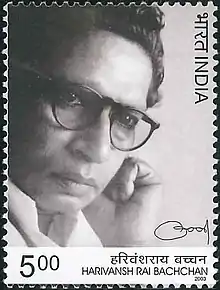Harivansh Rai Bachchan
Harivansh Rai Bachchan (né Srivastava; 27 November 1907 – 18 January 2003) was an Indian poet and writer of the Nayi Kavita literary movement (romantic upsurge) of early 20th century Hindi literature. He was also a poet of the Hindi Kavi Sammelan. He is best known for his early work Madhushala.[3] He was also the husband of social activist, Teji Bachchan, father of Amitabh Bachchan and Ajitabh Bachchan, and grandfather of Abhishek Bachchan. In 1976, he received the Padma Bhushan for his service to Hindi literature.[4]
Harivansh Rai Bachchan | |
|---|---|
 Bachchan on a 2003 stamp of India | |
| Born | Harivansh Rai Srivastava 27 November 1907 Babupatti, United Provinces of Agra and Oudh, British India (present-day Uttar Pradesh, India) |
| Died | 18 January 2003 (aged 95) Mumbai, Maharashtra, India |
| Pen name | Bachchan |
| Occupation |
|
| Language | Awadhi and Hindi |
| Alma mater | Allahabad University (B.A) St Catharine's College, Cambridge (PhD) |
| Notable awards | Padma Bhushan (1976) |
| Spouse |
|
| Children | 2 (including Amitabh Bachchan)[1] |
| Relatives | Bachchan family |
| Member of Parliament, Rajya Sabha[2] | |
| In office 3 April 1966 – 2 April 1972 | |
| Constituency | Nominated |
| Signature |  |
Personal life
Bachchan was born at Babupatti, United Provinces of Agra and Oudh in British India on 27 November 1907 into an Awadhi Hindu Kayastha family.[5][6] His family name was Srivastav.[7] He began using the pen name "Bachchan" (meaning child) instead of Srivastava when he wrote Hindi poetry. From 1941 to 1957, he taught in the English Department at the Allahabad University and after that, he spent the next two years at St Catharine's College, Cambridge, completing a PhD on W.B. Yeats.[3]
Bachchan married Shyama Bachchan in 1926. The latter died of tuberculosis in 1936. In 1941, he married Teji Suri.[8][9]
Writing career
Bachchan was fluent in several Hindi languages (Hindustani and Awadhi).[10] He incorporated a broadly Hindustani vocabulary,[11] written in Devanagari script.[10] While he could not read Persian script,[10] he was influenced by Persian and Urdu poetry, particularly Omar Khayyam.[12]
Works used in movies
Bachchan's work has been used in movies and music. For example, couplets of his work "Agneepath" are used throughout the 1990 film Agneepath, featuring his son Amitabh Bachchan, and also later in the 2012 remake Agneepath, starring Hrithik Roshan. and recently in the TV Serial Ishqbaaz. [13]
Mitti ka tan, masti ka man, kshan-bhar jivan– mera parichay.
(मिट्टी का तन, मस्ती का मन, क्षण भर जीवन, मेरा परिचय)
(A body of clay, a mind full of play, a life of a moment – that's me)[3]
List of works
|
|
|
See also
References
- Harivansh Rai Bachchan, R (2001). In the Afternoon of Time: An Autobiography. Penguin books. p. 327. ISBN 9780140276633.
When we entered Amit for school, we adopted 'Bachchan' as our family name, registering him as 'Amitabh Bachchan'; and when our second son was born, he was called 'Ajitabh Bachchan'
- "Nominated Members Since 1952". 164.100.47.5. Retrieved 19 March 2020.
- Harivanshrai Bachchan, 1907–2003[Usurped!] Obituary, Frontline, (The Hindu), 1–14 February 2003.
- "Padma Awards" (PDF). Ministry of Home Affairs, Government of India. 2015. Archived from the original (PDF) on 15 October 2015. Retrieved 21 July 2015.
- "खुली किताब सा जीवन : हरिवंश राय बच्चन की जीवनी के चार खंड!". The Better India - Hindi. 25 November 2016. Retrieved 5 August 2020.
- "Harivansh Rai Bachchan | Indian poet". Encyclopedia Britannica. Retrieved 17 October 2020.
- Harivansh Rai Bachchan. kya bhulun kya yaad karu. pp. 11–12.
- "इस बीमारी से हुई थी हरिवंश राय की पहली पत्नी की डेथ, इनसे की दूसरी शादी". Dainik Bhaskar (in Hindi). 2017. Retrieved 1 June 2023.
- "एक अफेयर से लेकर दो शादियों तक, ऐसी थी Amitabh Bachchan के पिता हरिवंश राय की ज़िंदगी". ABP News (in Hindi). 24 December 2020. Retrieved 1 June 2023.
- West-Pavlov, Russell (2018). The Global South and Literature. Cambridge University Press. p. 167. ISBN 9781108246316.
- Williams, Mukesh; Wanchoo, Rohit (2008). Representing India: Literatures, Politics, and Identities. Oxford University Press. p. 73. ISBN 9780195692266.
Harivansh Rai Bachchan recalled how some of the Urdu vocabulary used by audiences in appreciating poetic recitals in Hindi kavi sammelans was consciously changed to Sanskritized Hindi creating an artificial Hindi idiom.
- Gopal, Madan (1996). Origin and development of Hindi/Urdu literature. Deep & Deep Publications. p. 204.
He was influenced by Persian and Urdu poetry, especially by Omar Khayyam and started versifying in the Bachchalian style.
- Harivansh Rai Bachchan (1907–2003). IMDb
- Bachhan, Harivansh Rai. Madhubala by Harivansh Rai Bachchan.
- Baccana; Bachchan, Harivansh Rai (1 April 1998). In the Afternoon of Time: An Autobiography: Harivansh Rai Bachchan, Rupert Snell, Baccana, Harivansh Rai BacHChhan: 9780670881581: Amazon.com: Books. ISBN 0670881589.
External links
- मधुशाला का मूल पाठ (विकीस्रोत पर)
- हरिवंश राय बच्चन (हिन्दी विकीपीडिया पर)
- मधुशाला (हिन्दी विकीपीडिया पर)
- हरिवंश राय बच्चन (विकीस्रोत पर)
- A Collection Archived 10 May 2020 at the Wayback Machine
Further reading
- Kaveendra, Anil Pushker. Harivanshrai Bachchan Ki Anuvad Drishti (Hindi) (Hardcover) (2013). Ruby Press & Co., New Delhi. ISBN 978-93-82395-20-1